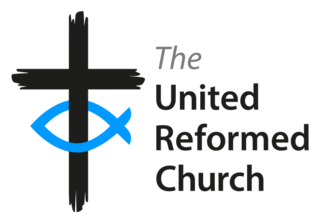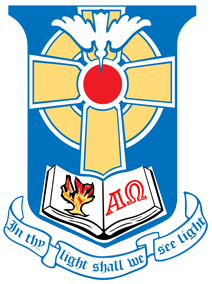Related Research Articles

Presbyterianism is a Reformed (Calvinist) Protestant tradition named for its form of church government by representative assemblies of elders. Though there are other Reformed churches that are structurally similar, the word Presbyterian is applied to churches that trace their roots to the Church of Scotland or to English Dissenter groups that formed during the English Civil War.

The Presbyterian Church (USA), abbreviated PCUSA, is a mainline Protestant denomination in the United States. It is the largest Presbyterian denomination in the country, known for its liberal stance on doctrine and its ordaining of women and members of the LGBT community as elders and ministers. The Presbyterian Church (USA) was established with the 1983 merger of the Presbyterian Church in the United States, whose churches were located in the Southern and border states, with the United Presbyterian Church in the United States of America, whose congregations could be found in every state.
Presbyterianpolity is a method of church governance typified by the rule of assemblies of presbyters, or elders. Each local church is governed by a body of elected elders usually called the session or consistory, though other terms, such as church board, may apply. Groups of local churches are governed by a higher assembly of elders known as the presbytery or classis; presbyteries can be grouped into a synod, and presbyteries and synods nationwide often join together in a general assembly. Responsibility for conduct of church services is reserved to an ordained minister or pastor known as a teaching elder, or a minister of the word and sacrament.

The Church of Scotland is a Presbyterian denomination of Christianity that holds the status of the national church in Scotland. It is one of the country's largest, having 259,200 members in 2023. While active membership in the church has declined significantly in recent decades, the government Scottish Household Survey found that 20% of the Scottish population, or over one million people, identified the Church of Scotland as their religious identity in 2019. The Church of Scotland's governing system is presbyterian in its approach, therefore, no one individual or group within the church has more or less influence over church matters. There is no one person who acts as the head of faith, as the church believes that role is the "Lord God's". As a proper noun, the Kirk is an informal name for the Church of Scotland used in the media and by the church itself.

The United Reformed Church (URC) is a Protestant Christian church in the United Kingdom. As of 2024 it had approximately 44,000 members in around 1,250 congregations with 334 stipendiary ministers.

Congregationalism is a Reformed (Calvinist) tradition of Protestant Christianity in which churches practice congregational government. Each congregation independently and autonomously runs its own affairs. These principles are enshrined in the Cambridge Platform (1648) and the Savoy Declaration (1658), Congregationalist confessions of faith. The Congregationalist Churches are a continuity of the theological tradition upheld by the Puritans. Their genesis was through the work of Congregationalist divines Robert Browne, Henry Barrowe, and John Greenwood.

The Presbyterian Church in America (PCA) is the second-largest Presbyterian church body, behind the Presbyterian Church (USA), and the largest conservative Calvinist denomination in the United States. The PCA is Reformed in theology and presbyterian in government.

The Cumberland Presbyterian Church is a Presbyterian denomination spawned by the Second Great Awakening. In 2019, it had 65,087 members and 673 congregations, of which 51 were located outside of the United States. The word Cumberland comes from the Cumberland River valley where the church was founded.
The Orthodox Presbyterian Church (OPC) is a confessional Presbyterian denomination located primarily in the United States, with additional congregations in Canada, Bermuda, and Puerto Rico. It was founded by conservative members of the Presbyterian Church in the United States of America (PCUSA), who objected to the rise of Liberal and Modernist theology in the 1930s. The OPC is considered to have had an influence on evangelicalism far beyond its size.

The Associate Reformed Presbyterian Church (ARPC) is a theologically conservative denomination in North America. The ARPC was formed by the merger of the Associate Presbytery (seceder) with the Reformed Presbytery (covenanter) in 1782. It is one of the oldest conservative denominations in the United States.

The Presbyterian Church in Canada is a Presbyterian denomination, serving in Canada under this name since 1875. The United Church of Canada claimed the right to the name from 1925 to 1939. According to the Canada 2021 Census 301,400 Canadians identify themselves as Presbyterian, that is, 0.8 percent of the population.
The Presbyterian Church of Aotearoa New Zealand (PCANZ) is a major Christian denomination in New Zealand. A part of the Reformed tradition, it is the largest Presbyterian denomination in New Zealand, and known for its relatively progressive stance on doctrine and social issues in comparison with smaller Presbyterian churches in the country. Presbyterianism was introduced to New Zealand by early 19th century settlers, particularly from Scotland and Ireland. It was historically most prevalent in the Otago region. The PCANZ was formed in 1901 with the amalgamation of southern and northern Presbyterian churches. It claims around 29,000 members.

The Bible Presbyterian Church is an American Protestant denomination in the Calvinist tradition. It was founded by members of the Presbyterian Church of America over differences on Eschatology and Abstinence, after having left the Presbyterian Church in the United States of America over the rise of Modernism.
The Cumberland Presbyterian Church in America is a historically African-American denomination which developed from the Cumberland Presbyterian Church in 1874.
The Presbyterian Church of Pakistan is the second largest Protestants denomination in Pakistan. It was formed in 1993 by the merger of United Presbyterian Church of Pakistan (1855–1993) and Council of Churches of Lahore.

The General Assembly of Presbyterian Church in Korea (GAPCK), also known as Yejang Hapdong (Korean: 예장합동) or just Hapdong, is an Evangelical Presbyterian denomination, which is the biggest Christian church in South Korea. The headquarters of the church is in Seoul, South Korea.
The Presbyterian Church of Africa was founded in 1898 by Rev. James Mzimba, who broke from the Church of Scotland. He was born in Ngquakai, and his father was a deacon in the Presbyterian Church. Mzimba become a pastor, and was ordained in 1875. He was sent to Scotland to the anniversary of the Free Church of Scotland, but later severed its ties with the denomination. In 1899 he founded his own independent Presbyterian church. He died in 1911. The first Synod was constituted in Alice, Cape Colony. Mzimba had a dispute with the Free Church of Scotland over land and over the use of money. The Presbyterian Church of Africa is a predominantly black church. It was a small group of churches with 2 presbyteries. The church grew steadily. It is one of the oldest independent churches in Africa.

Presbyterianism has had a presence in the United States since colonial times and has exerted an important influence over broader American religion and culture.
The Kosin Presbyterian Church in Korea, also called Korea-pa, is an Evangelical Reformed and Presbyterian denomination in the Republic of South Korea. Although, congregations have spread all over North America and in many other countries.